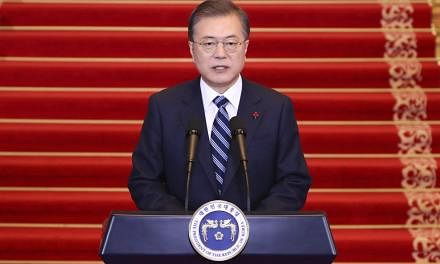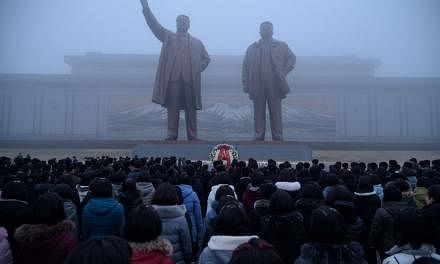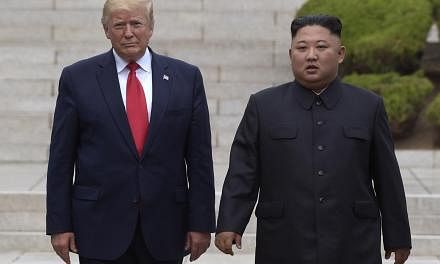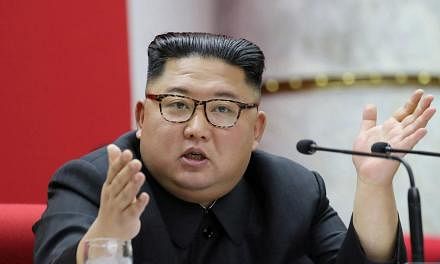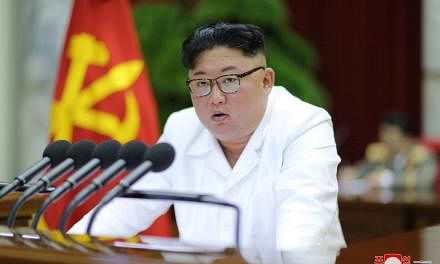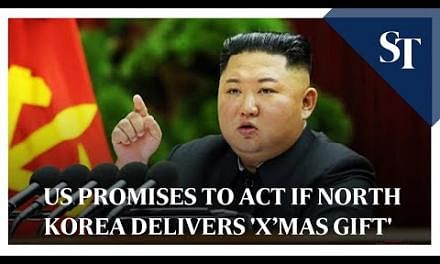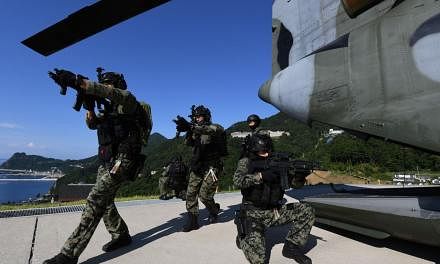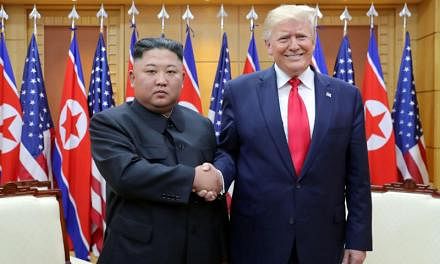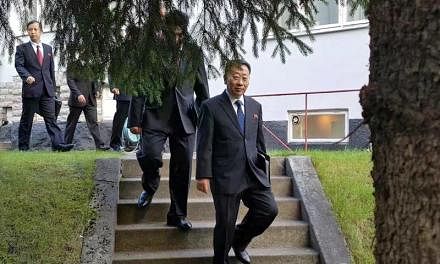Taking the next step...
Trump-Kim summit: What lies ahead after June 12

Expect officials and organisers to heave a sigh of relief if the June 12 summit between United States President Donald Trump and North Korean leader Kim Jong Un gets off to a good start and goes on smoothly.
Much will hinge on the few hours both leaders spend at the Capella, and the chemistry they strike up, to determine whether June 12 is the beginning of a long journey to peace on the Korean peninsula - or a strong but not yet sufficient momentum to resolve a longstanding flashpoint from the Cold War.
Observers and some officials remain sceptical of a breakthrough, but hopes are high.
As US Secretary of State Mike Pompeo said last Thursday: "The fact that our two leaders are coming to the table shows that the two sides are very serious. The diplomatic model we've used to date is different from past efforts. Our efforts give us hope that we can find real success where past efforts have fallen short."
The summit is part of a long process that began with Mr Kim's overtures this year, on the back of provocative missile tests and statements last year.
And the reverberations from June 12 will linger throughout this year - from Mr Pompeo's meetings with his counterparts from Seoul, Tokyo and, importantly, Beijing, right after the summit, to follow-up talks between Mr Kim and Mr Trump in the coming months.
There have been high points that give ground for cheer - Pyongyang's participation in the Winter Olympics in Pyeongchang, South Korea; the landmark meeting between Mr Kim, who is Chairman of his country's State Affairs Commission, and South Korean President Moon Jae In, in Panmunjom on April 27; and the flurry of shuttle diplomacy in and out of Pyongyang.
And there is much to look forward to: the participation of joint Korean teams at the Asian Games in Indonesia in August; reunions of families separated by the 1950-1953 Korean War on Aug 15; Mr Moon's visit to Pyongyang this fall; a possible visit by Mr Kim to the White House - and even the possibility of a joint Nobel Peace Prize.
The devil inevitably lies in the details - and they are not easy topics to reach agreement on.
Will North Korea agree to complete, verifiable and irreversible denuclearisation in a manner acceptable to America and its allies?
Will Washington be able to offer security guarantees that are acceptable to Pyongyang?
Will the various parties with a stake in the stability of the Korean peninsula be able to step up - but also stand firm - on core issues in the coming months?
Asean can play a role on this front, and Singapore, as chairman of the regional grouping this year, will again be in the spotlight when it hosts a series of meetings in early August involving the foreign ministers of all South-east Asian nations and their key dialogue partners, among them the Asean Regional Forum (ARF).
North Korea will be at the table at the ARF, a looser platform set up in 1993 to promote frank discussion of regional security issues, and that meeting can be an opportunity to underscore the need for progress to be made on contentious issues.
Asean has been there before.
When Pyongyang was first admitted to the ARF in July 2000, the leaders of North and South Korea had just held a historic summit a month earlier, and signed their first agreement since the division of Korea.
Then forum chairman Surin Pitsuwan, in his statement, noted that the summit was a turning point, and hoped "that the ongoing momentum of dialogue and interaction would be carried forward with a view to achieving lasting peace and eventual reunification on the Korean peninsula".
But the breakdown of the Six-Party Talks to end North Korea's nuclear programme in 2009 put this process on hold and last year, the US sought but failed to have Pyongyang booted from the ARF.
The circumstances have changed since then, but the need for concrete gains has not shifted.
Former Indonesian foreign minister Marty Natalegawa, in a recent opinion piece in this newspaper, noted that Asean "must provide a timely and relevant playbook to help 'lock in' the recent positive gains on the Korean peninsula".
"It certainly cannot be a bystander for any regression in the situation should the DPRK-US summit not bring the hoped-for positive results," Dr Marty wrote.
Referring to the acronyms of the official names for North and South Korea, he noted: "The political courage, diplomatic perseverance and resilience thus far shown by the DPRK and ROK to press on with efforts at dialogue and peaceful solutions - against all manner of headwinds, including the deeply entrenched interests of outside powers - are a reminder of Asean's own efforts in the earlier decades of its existence when it reached out to the other non-member South-east Asian countries, thereby creating eventually an Asean 10 and freeing the region of the deeply divisive impact of major powers' proxy rivalries."
The region faces greater geopolitical uncertainty today than it did in 2000, including the prospect of being divided by superpower rivalry.
But a stable Korean peninsula that is economically integrated is good for Moscow, Beijing and Tokyo as it is for Washington and South-east Asia.
No doubt, other players will court Pyongyang - as seen by the invitations to upcoming summits such as an economic forum in Russia in September - and seek to influence it.
One hopes that this time round, the gains will be more enduring.
Join ST's Telegram channel and get the latest breaking news delivered to you.
A version of this article appeared in the print edition of The Straits Times on June 11, 2018, with the headline Trump-Kim summit: What lies ahead after June 12 . Subscribe

